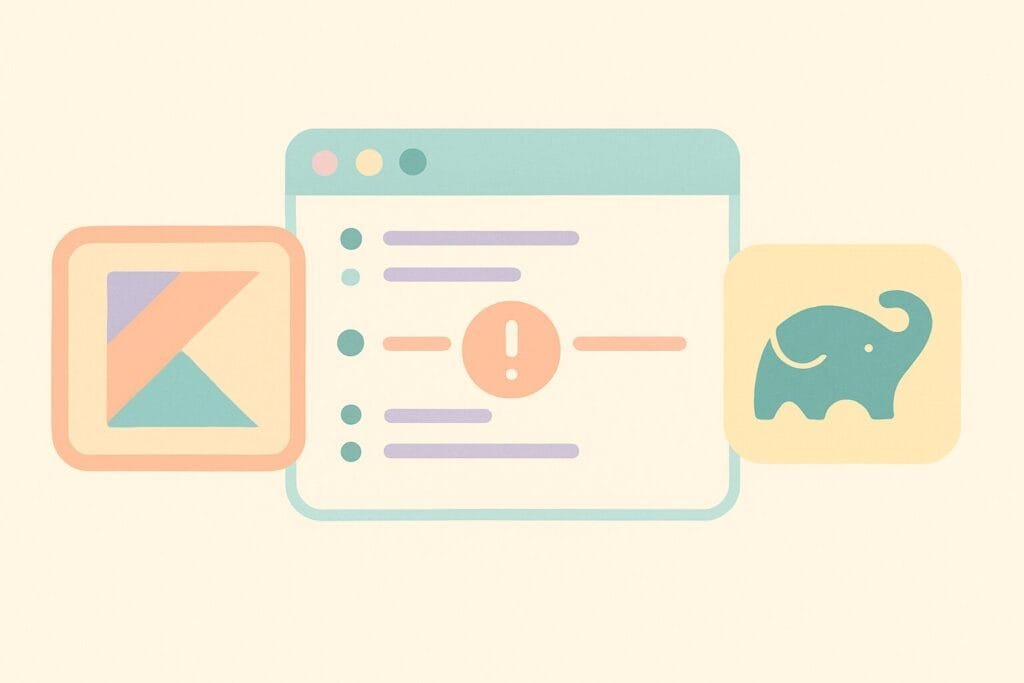Kotlin Dependency Version Conflicts in Gradle: How to Detect and Fix Them
Dependency conflicts are among the most frustrating issues when building Android or Kotlin applications using Gradle. These conflicts typically occur when different libraries require different versions of the same dependency. This leads to unexpected runtime behavior, crashes, or even failed builds.
In this article, you will learn what causes Kotlin dependency version conflicts in Gradle, how to detect them, and how to resolve them effectively using best practices and tools like the Gradle dependency insight task. We will also include a practical case study.

What Are Dependency Version Conflicts?
In Gradle, when multiple dependencies require different versions of the same library, Gradle tries to resolve the version by selecting the highest one by default. This might not always be compatible, especially when a library isn’t forward-compatible.
For example, suppose:
- Library A depends on
kotlin-stdlib:1.7.10 - Library B depends on
kotlin-stdlib:1.6.21
Gradle may pick version 1.7.10, but Library B might not function correctly with it.
Symptoms of Kotlin Dependency Conflicts
You may encounter these symptoms:
- NoSuchMethodError or ClassNotFoundException at runtime
- Build fails with cryptic errors
- IDE shows warnings about mismatched versions
- Inconsistent app behavior on different environments
How to Detect Conflicts in Gradle
Use the dependencyInsight task. Here’s a command-line example:
./gradlew :app:dependencyInsight --configuration debugCompileClasspath --dependency kotlin-stdlib
This shows a dependency tree and reveals version mismatches.
You can also run:This shows a dependency tree and reveals version mismatches.
You can also run:
./gradlew :app:dependencies
To see the full tree and spot potential conflicts manually.
Example Conflict Scenario
Here’s a real-world example in build.gradle:
dependencies {
implementation "org.jetbrains.kotlin:kotlin-stdlib:1.6.21"
implementation "com.squareup.retrofit2:retrofit:2.9.0"
implementation "com.squareup.moshi:moshi:1.12.0"
implementation "androidx.core:core-ktx:1.10.0"
}
Now suppose androidx.core:core-ktx:1.10.0 internally uses a newer kotlin-stdlib version (like 1.8.0). Gradle will silently upgrade it unless you handle it explicitly.
How to Fix Kotlin Version Conflicts
1. Force Kotlin Version
You can force a Kotlin version across all modules by using:
configurations.all {
resolutionStrategy {
force "org.jetbrains.kotlin:kotlin-stdlib:1.8.0"
}
}
Place this at the top-level or module-level build.gradle file depending on the scope of the issue.
2. Use buildscript Kotlin Version
Ensure all dependencies use the same Kotlin version as declared in buildscript.
buildscript {
ext.kotlin_version = "1.8.0"
...
dependencies {
classpath "org.jetbrains.kotlin:kotlin-gradle-plugin:$kotlin_version"
}
}
And then use:
implementation "org.jetbrains.kotlin:kotlin-stdlib:$kotlin_version"
3. Use Platform Dependency (BOM)
For newer Gradle versions, you can use Kotlin BOM to unify versions:
dependencies {
implementation platform("org.jetbrains.kotlin:kotlin-bom:1.8.0")
implementation "org.jetbrains.kotlin:kotlin-stdlib"
}
This is the cleanest way to ensure consistency.
Best Practices to Prevent Conflicts
| Practice | Description |
|---|---|
| Use BOM | Always prefer using Kotlin BOM |
| Avoid Hardcoding | Don’t hardcode Kotlin versions in multiple places |
| Sync Kotlin Gradle Plugin | Match plugin and stdlib versions |
Analyze With dependencyInsight | Regularly check for mismatches |
| Keep Libraries Updated | Use latest stable versions that are compatible with your Kotlin version |
External Resources
To learn more about dependency resolution strategies in Gradle, check the official documentation here:
https://docs.gradle.org/current/userguide/dependency_resolution.html
Conclusion
Kotlin dependency version conflicts in Gradle are common but manageable. By understanding how Gradle resolves versions and applying best practices like using BOM, enforcing resolution strategies, and syncing plugin versions, you can avoid runtime crashes and build inconsistencies.
Dependency hygiene should be a key part of your Kotlin and Android development workflow.

